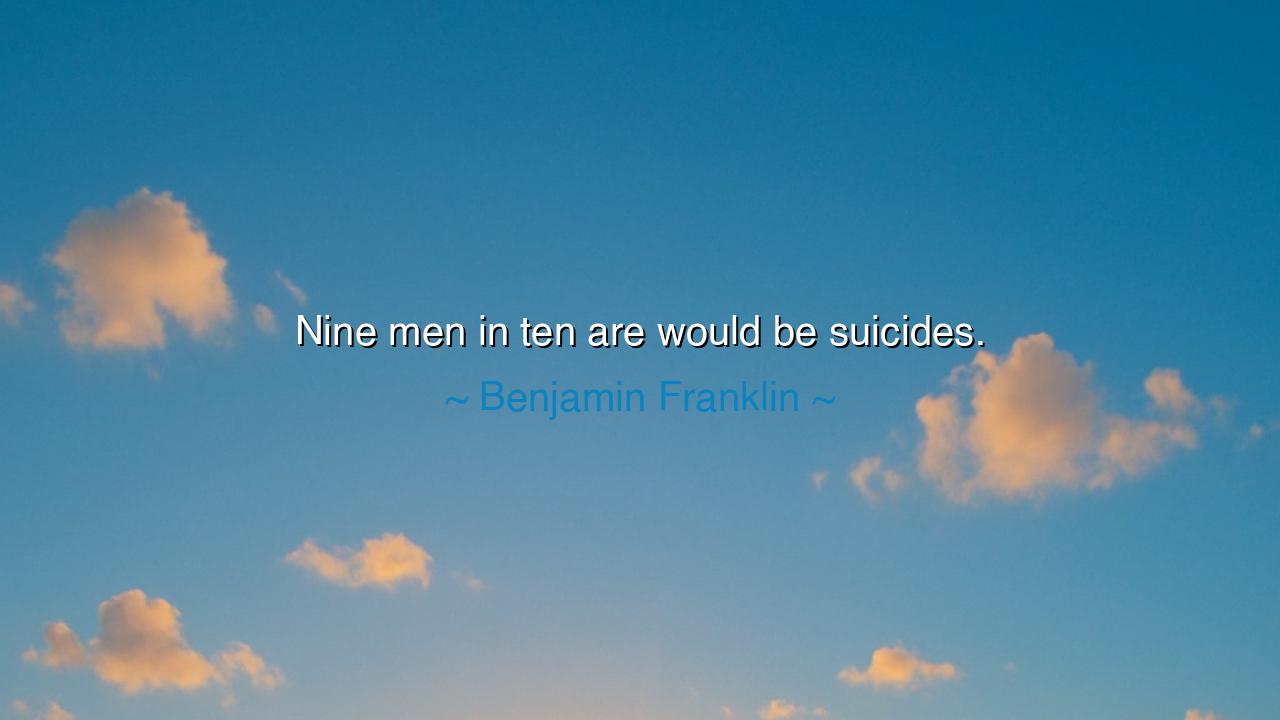
Nine men in ten are would be suicides.






Hear the severe and startling words of Benjamin Franklin, a man who clothed wisdom in brevity and truth in paradox: “Nine men in ten are would-be suicides.” At first hearing, these words strike like thunder, dark and unsettling. Yet they are not merely about death, but about the manner in which men live—how they squander their lives, despise their own condition, and by folly or despair shorten their days. Franklin, master of plain speech, here delivers a rebuke to the human tendency toward self-destruction, whether by vice, neglect, or the weariness of the soul.
The origin of this saying lies not in Franklin’s desire to condemn, but to awaken. He observed that most men, though they breathe, are not fully alive. They poison themselves with greed, with envy, with indulgence. They surrender to idleness when action is required, or to recklessness when patience is demanded. In so doing, they do not cherish the gift of life, but treat it as a burden to be escaped. Thus Franklin calls them “would-be suicides”—not always with the blade or the rope, but by the daily choice to betray their own vitality.
Consider the example of the Roman Senate in the age of decadence. Once men of courage and vision, the senators of later Rome sank into luxury and corruption. They dulled their spirits with wine and excess, abandoning the duties that once made their republic strong. Though alive, they had surrendered to decay; their suicide was not sudden, but slow, enacted by indulgence and neglect. The fall of Rome itself was the fruit of a people who ceased to love life rightly and gave themselves over to destruction.
Yet Franklin’s words also reflect the private despair that often grips the heart of man. History tells of Vincent van Gogh, the painter of suns and stars, who wrestled with torment and longing. His art revealed fire, but his soul was consumed by shadows. He chose the path of literal suicide, a tragic reminder that even brilliance does not shield the heart from despair. Franklin’s phrase is a stark mirror: how many men carry hidden wounds, despising their existence, longing for an escape? His exaggeration—nine in ten—was meant to awaken compassion as well as warning.
The meaning of this quote is therefore double-edged. It warns us of the ways in which men destroy themselves through vice, neglect, and folly. It also unveils the silent suffering of countless souls who live without hope, seeing life as a burden rather than a gift. Franklin does not glorify this truth; he confronts it, urging us to recognize how fragile the human heart is, and how necessary it is to live with purpose, discipline, and joy.
The lesson is clear: life is a treasure, but one easily squandered. Do not despise your days with constant complaint, nor waste them with idle pleasures that eat away at strength. Guard your body against excess, your mind against despair, and your soul against bitterness. Seek meaning in work, beauty in creation, and strength in virtue. For he who cherishes life rightly will not fall into the ranks of the “would-be suicides,” but will stand among those few who truly live.
Practical actions flow from this wisdom. Cultivate gratitude each morning, for gratitude is the antidote to despair. Discipline your appetites, for self-control strengthens the will to live. Serve others, for in giving life to another, you discover the value of your own. And when the shadows of sorrow rise, do not bear them alone—seek the fellowship of friends, the counsel of the wise, the comfort of faith. These are the weapons against the slow destruction that Franklin warned of.
Thus, let us remember Franklin’s severe warning: “Nine men in ten are would-be suicides.” Let it not be said of us. Let us instead live as those who cherish breath, who use time well, who guard their days with care. For life, once wasted, cannot be reclaimed, but life embraced can shine with a fire that no despair can extinguish.






AAdministratorAdministrator
Welcome, honored guests. Please leave a comment, we will respond soon